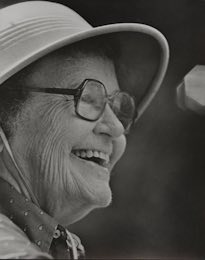A pioneer in limnology ‚”the scientific study of the life and phenomena of freshwater bodies ‚” Ruth Patrick provided methods needed to monitor water pollution and understand its effects.
Patrick grew up in Kansas, where her father helped shape her interest in natural sciences. She and her family would often venture into the woods. From an early age, Patrick admitted to collecting mushrooms, worms, and rocks. She became fascinated with science after receiving her first microscope, at the age of seven. She went on to receive her bachelor’s degree in biology from Coker College in 1929, and completed her masters and doctorate degrees in botany at the University of Virginia.
Patrick’s long career at the Academy of Natural Sciences spanned many years, beginning in 1933 with her position as an unpaid researcher and volunteer curator. She then became curator of the Academy’s Leidy Microscopical Collection and promptly revived the institution’s research in diatoms. Her pioneering work, begun in the 1940s and dubbed The Patrick Principle, became the fundamental principle on which all environmental science and management is based. Patrick proved that biological diversity holds the key to understanding the environmental problems affecting an ecosystem.
In 1947, Patrick founded the Limnology Department at the Academy of Natural Sciences. She led the department until 1973, and a decade later, it was renamed the Patrick Center of Environmental Research in her honor. She was the first female elected chair of the board of the Academy of Natural Sciences and the first female board member of DuPont. Patrick received the National Medal of Science in 1996 for “her algal research, particularly the ecology and paleoecology of diatoms, and for elucidating the importance of biodiversity of aquatic life in ascertaining the natural condition of rivers and the effects of pollution.”
Called “a den mother for generations of scientists,” and a “visionary ecologist,” Ruth Patrick was a champion of environmental protection, as well as a mentor and inspiration to future scientists for more than seventy years. Patrick is credited, along with Rachel Carson, as being largely responsible for ushering in the current worldwide concerns with ecology.

